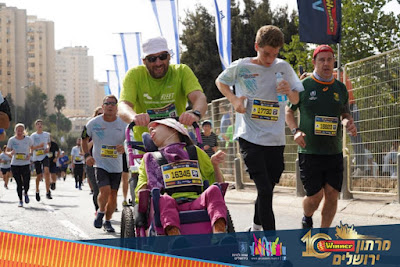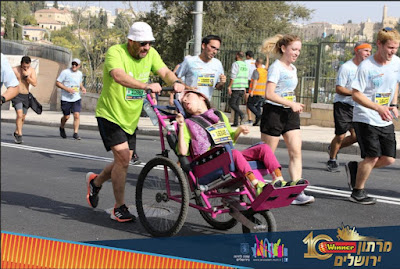Interview conducted by Sharona Cohen
Mechanical engineer Aryeh Holtz shares his story about his daughter Leah, their experience running the Jerusalem 10K together, how he built the world's best running stroller, and what it means to have a child with special needs.
Sharona Cohen: Tell me about little about your history - where you’re from, your childhood, how you ended up in Israel, etc.
Aryeh Holtz: I grew up in Washington Heights, NY and went to Modern Orthodox day schools. After high school I came to Israel for a year of learning and I never went back.
SC: I understand you learned at the Bet El Yeshiva. How did you end up there and what was your experience there? Are you still connected to the Yeshiva?
AH: After high school I went straight to the Bet El Yeshiva with two other guys from my high school. I chose Bet El largely because I wanted to be in an Israeli and Hebrew speaking environment.
I had a ton of fun there. There were students from all over the world - France, England, Brazil, Belgium. I stayed for one year at the Yeshiva and then enlisted in the Nachal Hesder (infantry unit, joint army service/Yeshiva learning) program in the army.
While in the army I rented a caravan (trailer) in Bet El and after my first portion of army service I went back to the Yeshiva for the learning portion of the program. After the army, I enrolled in the Technion to study mechanical engineering and I continued to rent half a caravan in Bet El at the time to store many of my things.
Today I own a company where I work as a mechanical engineer and to this day I am still in touch with Ketzaleh (Yaakov "Ketzaleh" Katz) who was one of my "adoptive parents" when I first got to Bet El.
SC: Tell us about your family? How did you and your wife meet? How many children do you have? What was it like when your twins were born? How was it adjusting to life with a child with special needs? How did life with your special needs child change your perspective/worldview/spiritual outlook?
AH: My wife and I met while we were both studying at the Techion. She had come from Australia and was studying for her Masters. Mutual friends introduced us and we got married in 1993 - we're about to celebrate 29 years! Four years after we got married we had twin girls. After about two months they began having problems and we spent four months in the hospital in Haifa, where we were also living at the time.
At some point during their stay in the hospital, one of our daughters, Leah, stopped breathing and the nurses didn't notice. By the time they did, she already had permanent brain damage from lack of oxygen. Because my time was split between the two units where my daughters were, I walked in during the resuscitation and it's an image I will never forget. Eventually they were both released and we began to move forward.
Having a child with special needs has definitely made me more accepting of other people. And when I say Asher Yatzar (blessing made after relieving oneself) I say it with a lot of kavana (intention) because I know what it is when the body doesn't work properly. I've probably become stronger internally.
Thank G-d today our life is good. Our other daughter Miri (the twins are 24) is engaged and our son, who is 18, will be graduating high school this year.
SC: You built a stroller so you could run a 10K with your daughter. How long did it take you to design and build the stroller? Is it something you plan to produce more of and sell?
AH: I had been running through the idea in my mind for a long time. From the time I wrote out the specifications until I actually made it was about three years. The actual design, collecting the materials, and building it took about half a year. That was right around when Covid happened so I had a lot more time on my hands.
If someone wanted to buy one I would be more than happy to sell more, but they are not cheap. It was custom made for both the person who sits and for the person who pushes. I went through several iterations and came up with something much stronger and much lighter than anything else on the market. I did this by eliminating the option of changing things; I found the optimum position for the seat, and everything is designed around that. It makes it much stronger and lighter because there aren't a ton of screws everywhere. So it has to be custom made. The cost of the materials alone was over 30,000 NIS.
SC: Tell us about the race - What is your typical time for a 10K and what was your time running with your daughter? Did you train together as well? How involved was your family in the race?
AH: In the Jerusalem 10K, Leah's time was 1:02:37 and mine was 1:02:38 - she beat me by one second. We trained for over a year and we can do the 10K route by my house in under 56 minutes. My other daughter, Miri, ran in the race as well and my son had intended to but had a school trip. My wife has run in previous years but she sat this last one out.
SC: If you could give over one inspirational message to our readers, what would it be?
AH: Israel is our home. Wouldn't trade here for any other place, that's for sure. I merit to live in Jerusalem. On Shabbat I can walk to the Kotel for mincha [afternoon prayer service]. (This is actually much more doable these days with the stroller; other strollers would come apart trying to get around the Old City, ours is sturdy enough to withstand the ancient walkways.)


